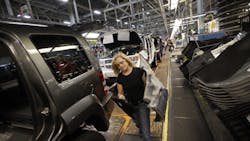July Jobs Report: Manufacturing Gains Strong but Uneven
On the hiring front, U.S. manufacturers posted strong overall numbers in July, but some nagging laggards remain among the gainers.
According to this morning's monthly jobs report from the Labor Department, American manufacturers added a net total of 28,000 workers last month.
Moreover, more than half of that gain came from the automobile sector.
Among the interesting results in this month's report:
● There was a huge disparity in job gains between Durable and Nondurable Goods. The Durable Goods sectors added a combined 30,000 workers, while the Nondurable Goods sectors shed a combined 2,000 jobs.
● The shining star in July was Motor Vehicles and Parts, which added a robust 14,600 jobs.
● The other transportation equipment sectors—aerospace, railroad rolling stock, ships and boats—were strong as well, adding a combined 4,600 jobs.
● Other sectors showing big gains were Furniture, +3,200 jobs; Fabricated Metals, +2,600; and Textiles, +2,400.
● The sector that experienced the biggest loss was Food, which shed 3,600 jobs.
| MANUFACTURING EMPLOYMENT BY SECTOR (Thousands of Jobs) | |||
| June '14 | July '14 | Change | |
| Manufacturing - Total | 12,132.0 | 12,160.0 | 28.0 |
| Durable Goods- Total | 7,665.0 | 7,695.0 | 30.0 |
| Wood Products | 367.6 | 369.0 | 1.4 |
| Nonmetallic Mineral Products | 386.3 | 384.9 | -1.4 |
| Primary Metals | 399.8 | 401.5 | 1.7 |
| Fabricated Metal Products | 1,453.2 | 1,455.8 | 2.6 |
| Machinery | 1,127.5 | 1,128.6 | 1.1 |
| Computer & Electronic Products | 1,056.2 | 1,057.8 | 1.6 |
| ►Computer & Peripheral Equipment | 165.5 | 166.7 | 1.2 |
| ►Communications Equipment | 97.9 | 97.7 | -0.2 |
| ►Semiconductors & Electronic Components | 367.7 | 367.4 | -0.3 |
| ►Electronic Instruments | 386.2 | 387.1 | 0.9 |
| Electrical Equipment & Appliances | 374.0 | 373.0 | -1.0 |
| Transportation Equipment | 1,553.8 | 1,573.0 | 19.2 |
| ►Motor Vehicles & Parts | 864.7 | 879.3 | 14.6 |
| Furniture & Related Products | 367.2 | 370.4 | 3.2 |
| Miscellaneous Durable Goods | 579.8 | 580.9 | 1.1 |
| Nondurable Goods - Total | 4,467.0 | 4,465.0 | -2.0 |
| Food | 1,473.2 | 1,469.6 | -3.6 |
| Textile Mills | 116.9 | 117.1 | 0.2 |
| Textile Product Mills | 110.5 | 112.9 | 2.4 |
| Apparel | 132.3 | 132.1 | -0.2 |
| Paper & Paper Products | 375.9 | 374.8 | -1.1 |
| Printing & Related Support Activities | 441.5 | 440.5 | -1.0 |
| Petroleum & Coal Products | 113.8 | 113.6 | -0.2 |
| Chemicals | 802.3 | 802.6 | 0.3 |
| Plastics & Rubber Products | 664.3 | 664.2 | -0.1 |
| Miscellaneous Nondurable Goods | 236.2 | 237.5 | 1.3 |
| Source: U.S. Bureau of Labor Statistics | |||
Good Could Be Better
Industry analysts were guardedly upbeat about the Labor Department's report.
Chad Moutray, chief economist with the National Association of Manufacturers, called the numbers "positive, but not overwhelmingly so."
"Behind the scenes, we still get a sense that job gains could have been greater," Moutray said. "The labor market continues to have too many people who are either underemployed or employed part-time, and the participation rate remains at historic lows."
Moutray noted that while the manufacturing sector has posted three consecutive strong months of job growth, "One could easily make the case that hiring should be more broad-based."
He cited two examples: the auto sector's accounting for over half of July’s job gains, and the nondurable goods sector's continued struggles.
"Ideally, we will see all sectors within manufacturing experience job gains moving forward," Moutray said.
Scott Paul, president of the Alliance for American Manufacturing, noted while the July jobs gains are promising, the manufacturing sector is still far short of the goal of a million new jobs set by President Obama for his second term.
"Manufacturing punched above its weight in July, showing that a rebound in the sector is possible," Paul said, "but we still have a long way to go."
He noted that while the private sector has recovered all of the jobs lost during the Great Recession, manufacturing is only 30% of the way back, and several obstacles are blocking "a true resurgence": inadequate investment in infrastructure, high trade deficits, and currency manipulation by several countries, including China and Japan.
"It’s important for Congress and the administration to get the policy right so that we’ll have more to cheer about," Paul said. "The significance of the auto sector and its supply chain was amplified by the July jobs numbers. To keep this sector healthy and vibrant, we should build on that by ensuring that trade agreements like the Trans-Pacific Partnership prohibit currency manipulation."
About the Author
Pete Fehrenbach
Pete Fehrenbach, Associate Editor
Focus: Workforce | Chemical & Energy Industries | IW Manufacturing Hall of Fame
Follow Pete on Twitter: @PFehrenbachIW
Associate editor Pete Fehrenbach covers strategies and best practices in manufacturing workforce, delivering information about compensation strategies, education and training, employee engagement and retention, and teamwork. He writes a blog about workforce issue called Team Play.
Pete also provides news and analysis about successful companies in the chemical and energy industries, including oil and gas, renewable and alternative.
In addition, Pete coordinates the IndustryWeek Manufacturing Hall of Fame, IW’s annual tribute to the most influential executives and thought leaders in U.S. manufacturing history.

